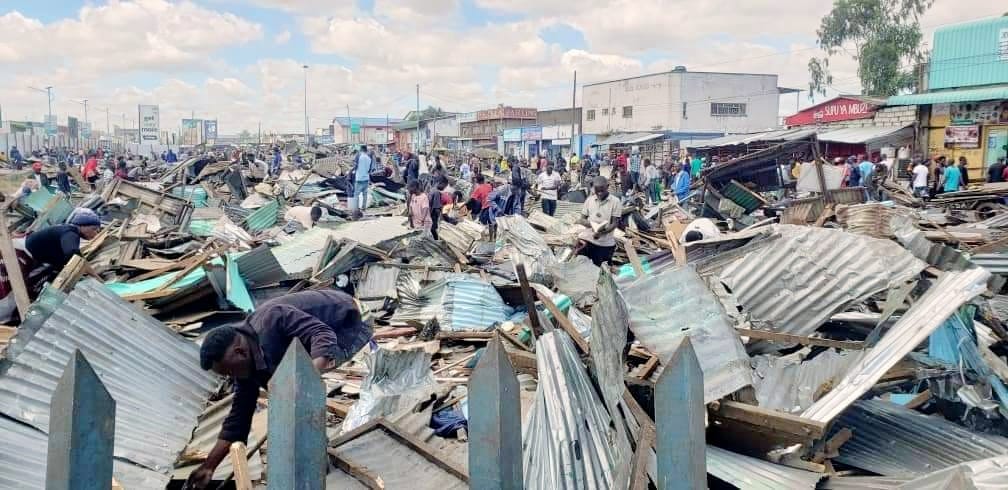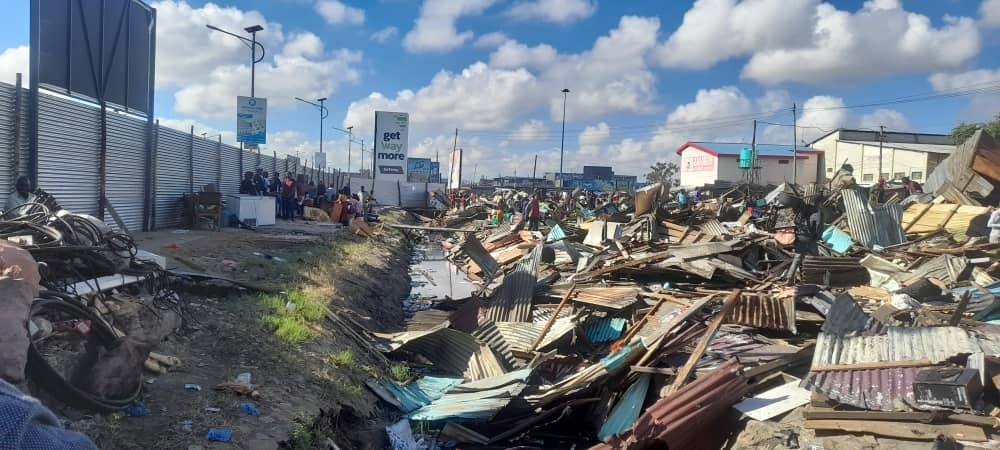Fighting gentrification in Lusaka’s Munyale Market
Mputa Ngalande
Mputa Ngalande, FIA Zambia National Coordinator shares the story of gentrification of a traditional marketplace in Lusaka, Zambia, and how this is being resisted. This is a phenomenon in many cities across the world.
In the heart of Lusaka, Zambia, behind City Market, lies the vibrant Munyaule Market, bustling with traders and makeshift shops alike. However, on a fateful Sunday morning, March 2, 2024, the landscape changed dramatically as bulldozers descended upon the market, leaving destruction in their wake. The traders, over 1000 of whom had called Munyaule Market their livelihood, Lusaka city council had offered trading spaces to marketeers way back in 2003, and the market has been growing since. They were suddenly left without a place to conduct their businesses.

As the dust settled and the reality of the demolition set in, the Fight Inequality Alliance (FIA) Zambia stepped up to advocate for justice on behalf of the affected traders. These traders come from informal settlements in the capital city, where they are marginalised and face inequalities such as poor medical care, economic hardship, and unemployment. FIA Zambia has embarked on a journey to ensure that the voices of the vulnerable traders are heard and their rights upheld by way of compensating through funds (money) for the many who lost goods and capital at the hands of the authorities who are supposed to protect their livelihood in this harsh economy. With the ever rising cost of living, it is a well known fact that the price of basic commodities has more than doubled in the last two and a half years. A responsible government that cares for the people would have taken measures to relocate the traders and provide alternatives so they could continue providing for their families.
The marketeers I talked to mentioned that the authorities had promised them that they were going to be relocated to the new market being constructed at Simon Mwewe Lane, but to their rude shock in the early hours of Sunday, March 2nd, to find their capital gone at the hands of the authorities who are supposed to protect them and their goods, one woman said it was her only source of income since her husband died three years ago, and she used this income to take care of her children's needs and put food on the table. One young man told me that he lost 10,000 Kwacha that he had invested in his business, and he didn't know what to do next because he had banked on his small business as a survivor. He wondered why the authorities did not wait for them to come and tell them to remove the properties before they started demolishing the place.
In the aftermath of the demolition, government officials were quick to justify their actions, citing plans for the construction of a modern market aimed at enhancing infrastructure and preventing future outbreaks of diseases like cholera (statement here). While these intentions sound like they may have been noble, the plight of the traders cannot be overlooked.
Our stance as FIA Zambia is to call for government accountability and urge authorities to compensate the traders for their losses. On March 5, 2024, FIA Zambia issued a statement demanding fair treatment for the Munyaule traders, emphasising the need to prioritise the well-being of the vulnerable over the interests of multinational corporations such as Kaddoura Construction Limited, a partner of Coral Investment Limited, who are the said developer of the market through a Public Private Partnership (PPP), another form of debt that the alliance has advocated against, Coral Investment Limited is well known company that lends money to African countries. Is this another debt? That's the question we must ask, and how much will we lose as a country?

Despite assurances from the government that alternative trading spaces would be provided once the modern market was completed, FIA Zambia remained steadfast in their advocacy efforts. Highlighting the harsh realities faced by the traders, who were not only left without a source of income but also lost their merchandise in the demolition,
With each passing day, the uncertainty surrounding the future of the Munyaule traders grows, prompting FIA Zambia to intensify its call for action. On March 7, 2024, through a statement I issued, FIA Zambia reiterated our stance, urging the government to reconsider their decision not to compensate the traders. Emphasising that leaving the traders in such dire circumstances would only perpetuate poverty and widen the inequality gap, you can refer to the statement here.
Meanwhile, amidst the turmoil and uncertainty, the traders of Munyaule Market continued to salvage what they could from the rubble, wondering what the future held for them. Questions linger about why the council had issued offer letters for ownership of the land to the traders if eviction was imminent and why adequate alternatives had not been provided prior to the demolition.
As the saga of Munyaule Market unfolds, FIA Zambia will remain a steadfast advocate for the rights of the traders, amplifying their voices and pushing for justice to be served. While the road ahead may be fraught with challenges, one thing remains clear: the fight for justice and equality continues, and FIA Zambia stands at the forefront, unwavering in their commitment to a fair and just society for all.
